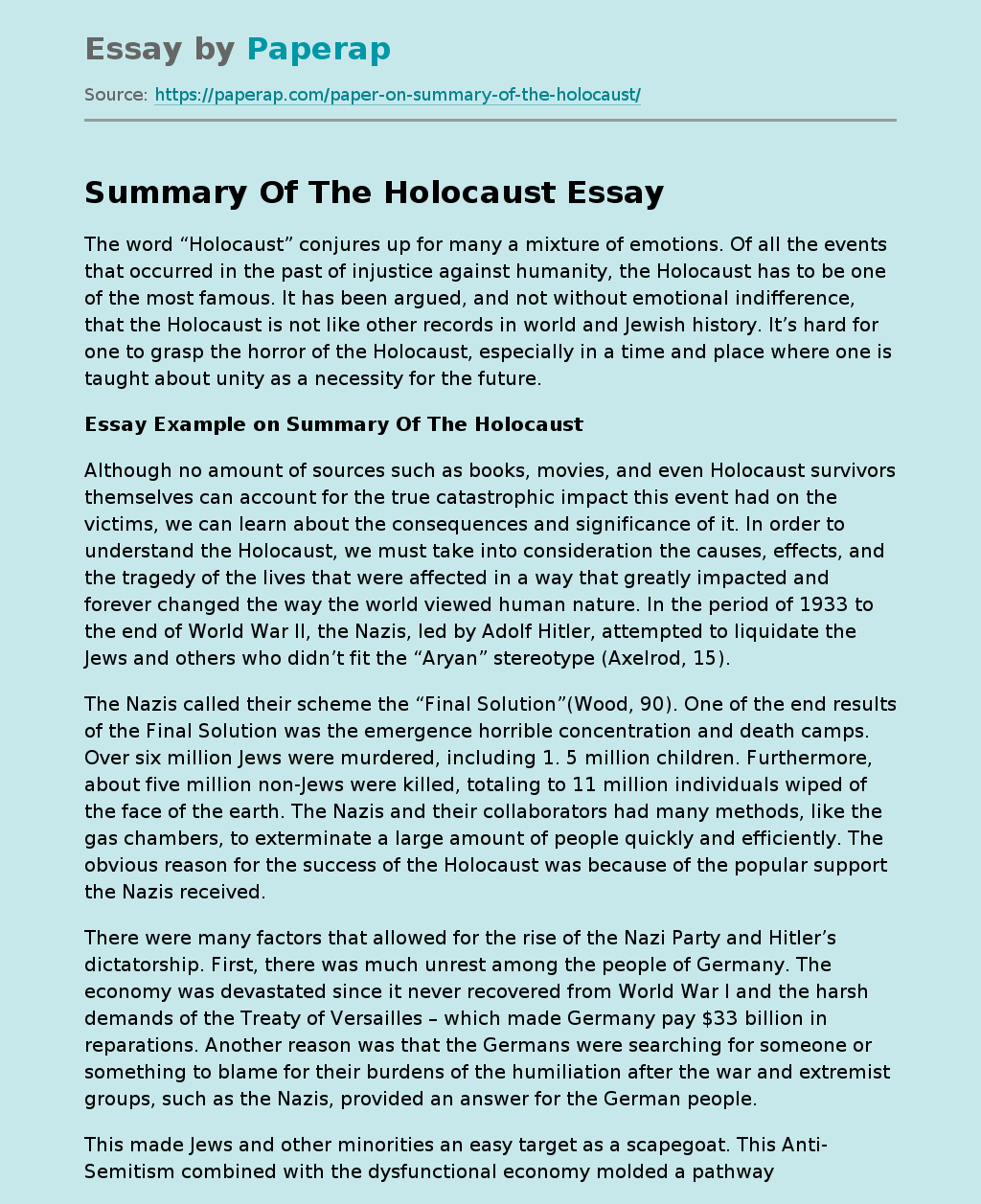Summary Of The Holocaust
The word “Holocaust” conjures up for many a mixture of emotions. Of all the events that occurred in the past of injustice against humanity, the Holocaust has to be one of the most famous. It has been argued, and not without emotional indifference, that the Holocaust is not like other records in world and Jewish history. It’s hard for one to grasp the horror of the Holocaust, especially in a time and place where one is taught about unity as a necessity for the future.
Essay Example on Summary Of The Holocaust
Although no amount of sources such as books, movies, and even Holocaust survivors themselves can account for the true catastrophic impact this event had on the victims, we can learn about the consequences and significance of it. In order to understand the Holocaust, we must take into consideration the causes, effects, and the tragedy of the lives that were affected in a way that greatly impacted and forever changed the way the world viewed human nature.
In the period of 1933 to the end of World War II, the Nazis, led by Adolf Hitler, attempted to liquidate the Jews and others who didn’t fit the “Aryan” stereotype (Axelrod, 15).
The Nazis called their scheme the “Final Solution”(Wood, 90). One of the end results of the Final Solution was the emergence horrible concentration and death camps. Over six million Jews were murdered, including 1. 5 million children. Furthermore, about five million non-Jews were killed, totaling to 11 million individuals wiped of the face of the earth.
The Nazis and their collaborators had many methods, like the gas chambers, to exterminate a large amount of people quickly and efficiently. The obvious reason for the success of the Holocaust was because of the popular support the Nazis received.
There were many factors that allowed for the rise of the Nazi Party and Hitler’s dictatorship. First, there was much unrest among the people of Germany. The economy was devastated since it never recovered from World War I and the harsh demands of the Treaty of Versailles – which made Germany pay $33 billion in reparations. Another reason was that the Germans were searching for someone or something to blame for their burdens of the humiliation after the war and extremist groups, such as the Nazis, provided an answer for the German people.
This made Jews and other minorities an easy target as a scapegoat. This Anti-Semitism combined with the dysfunctional economy molded a pathway for the Nazi Party to rise in Germany. It is important to point out that Hitler and the Nazis came to power by the votes of ordinary people. The Great Depression hit Germany the hardest and the Nazi message appealed more than ever (Wood, 34). The country’s hunger, unemployment, and despair left the people looking for something to cling to- and the Nazi party was it. At first, there wasn’t much support for the Nazis (Wood, 34).
The other parties, although much larger, were much divided and therefore had a difficult time uniting and gaining support. The Nazi party’s propaganda was easy to accept: It certainty offered hope, and its provision of a scapegoat was pleasing. Gradually, the Nazi increased their influence, especially with young people with things such as the youth movements, which became almost compulsory. In the aftermath of the Holocaust, people around the world were shocked by final scores of human losses, and the people responsible were punished for their inhuman acts in the Nuremburg Trials.
The Holocaust is significant to many people today, and to an equal number of people means very little. It illustrates that we are still a society that’s in the process of searching for knowledge in developing how we treat one another, whether it is for race or faith. The Holocaust stands out as the most current oppressive action against a religion and from this came the most notable phrase, “never again. ” The Holocaust was a dark time in the history of the 20th century and we must remember it in order to keep alive the memories of those who suffered and lost their lives in this terrible event.
Summary Of The Holocaust. (2019, Nov 27). Retrieved from https://paperap.com/paper-on-summary-of-the-holocaust/

